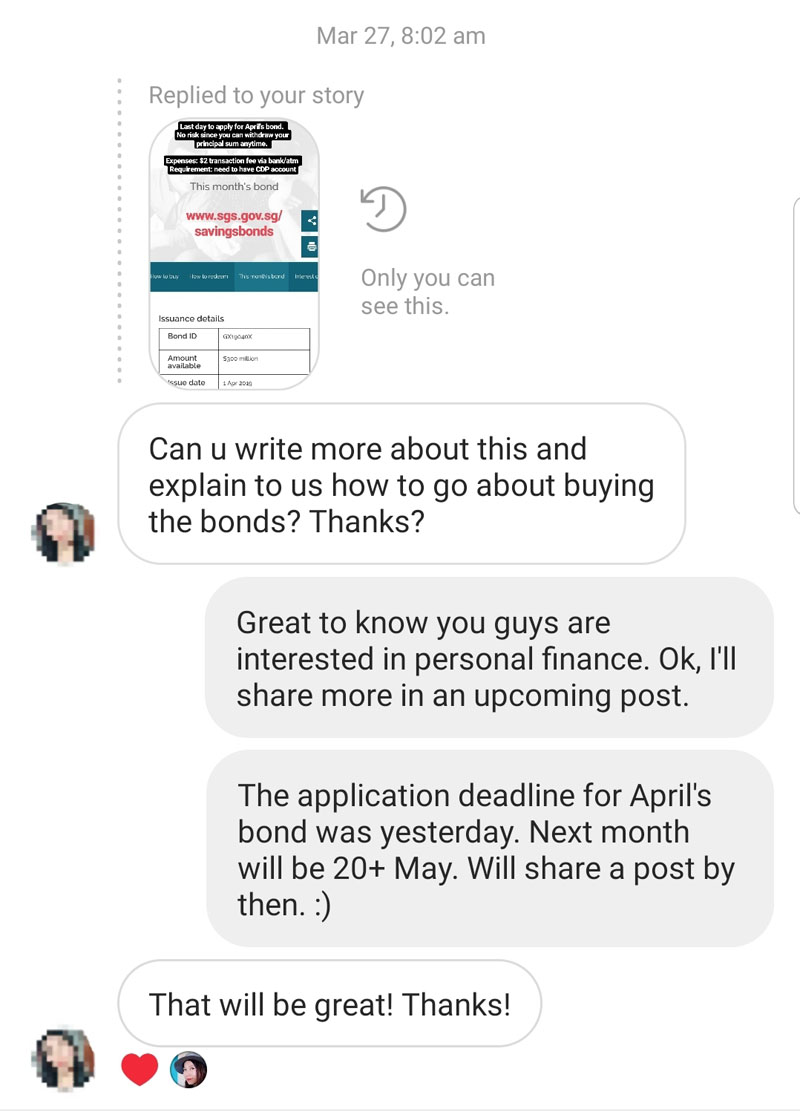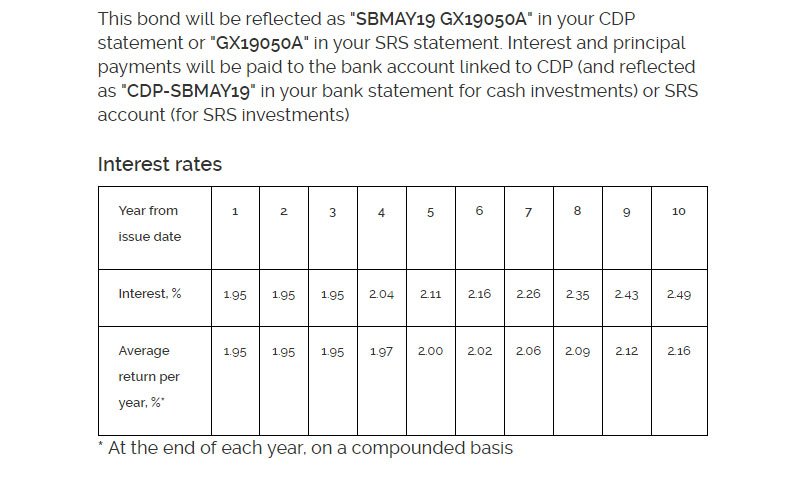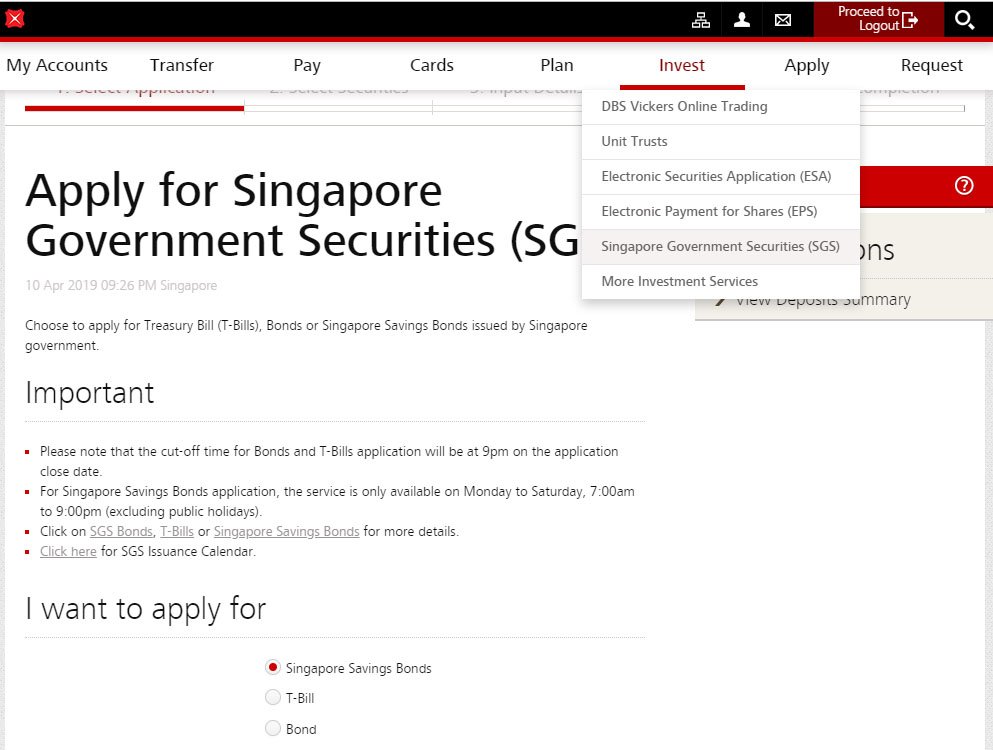How safe is the Singapore Savings Bonds (SSB)? And should you apply for it?
Hey, guys! You didn’t come to the wrong website – this is my first finance-related post and I’m dedicating this to one of my Instagram readers. I’d posted an Instagram Story to remind my followers on SSB application deadline. Well, I was surprised and delighted that my readers are also into personal finance, in addition to beauty and travel.
Update (2022): This post was first published in April 2019 and updated to include latest info.

One reader – Miss C – messaged me and asked if I could provide more details. So, here’s my virgin attempt in crafting a finance post. Don’t worry. I know what I’m doing. ;) This is another of my passions in life. I’ll try to explain the Singapore Savings Bonds in layman’s term to make it easy for non-finance trained person to understand.

Tell Me More about Singapore Savings Bonds
The Singapore Savings Bond (SSB) is a government bond programme launched in 2015. What happens is that every month, a new bond will be issued with a tenure of 10 years. Say if you had applied for the May 2019’s bond, you would enjoy 10-year interest rates specific to this particular bond issue (Bond ID: GX19050A).
May 2019’s interest rates were shown in the table below. The longer you hold the bond, the higher the corresponding interest rate for that year would be, e.g. you would get 2.04% in the 4th year (May 2023).

If you had applied for April 2019’s bond like I did, you would enjoy a totally different set of 10-year interest rates, as shown below.

So, as you can see, the 10-year rates would differ from month to month. When SSB was first launched, the interest rates were climbing up steadily, led by the changes in US. For instance, the first year’s interest rate for Jan 2018 issuance was just 1.32%. Subsequent bond issuance reached a peak of over 2% a year later.

Since reaching the peak in Jan 2019, the interest rates had been declining until 2022 when the rate is starting to rise again.
This is 2022’s rate as at time of update of this post. Do note that the trend will change from time to time depending on economic variables.

Is Singapore Savings Bonds Safe?
I’m not an expert or a certified adviser and hence am not able to give any recommendations here (disclaimer). However, I think it’s okay to share my opinions. :)
I believe the Singapore Savings Bonds is safer than most investment instruments out there. It’s backed by the Singapore government which is known to be very stable and rich. :) We have a good surplus.
When something is safe, the interest rates would naturally be low (or else, everyone would want a piece of it). Therefore, although the Singapore Savings Bonds is safe, it doesn’t mean that it’s the best place to put all your money. You’ll have to factor in inflation rates and also see if there are other ways to allocate your funds for better returns (e.g. REITS, Corporate Bonds, Stocks, mutual funds etc).
So, should you consider Singapore Savings Bonds?
Personally, I treat Singapore Savings Bonds just like how I view short-term fixed deposits, albeit a better version. If I need a certain amount as emergency funds (means it has to be readily available), I would place it in Singapore Savings Bonds.

1. Early Redemption of SSB Comes with No Penalty
Other than the $2 transaction fee, there is no penalty in early redemption for SSB. You’ll still get the accrued interest (meaning interest you have earned thus far). This is already an advantage as compared to a bank fixed deposit because I believe you may earn lesser or no interest if you withdraw your fixed deposits prematurely.
2. Less Risky than Corporate Bonds
At any time that you like to redeem your Singapore Savings Bonds, you can get back your full principal, plus accrued interest. This is less risky than corporate bonds.
Price fluctuates due to Company’s “Health”
Say if you have bought a corporate bond at $1 a piece, the value at any time before maturity may differ depending on economic situation. If it’s above $1, then good for you. But it may also drop below $1, which means you will make a loss if you need the fund urgently.
Normally, bond prices may drop under par value (i.e. $1 in this example) if the company is not doing well or has a poorer financial health than when the bond was first issued. For instance, the table below shows the prices for each bond in April 2019.

The first bond ‘Hyflux’ was suspended – investors couldn’t sell it even if they’d wanted to. The second one – Aspial – was under par value, probably because it had a higher risk profile (a more leveraged company).
The last three were trading over par value. So, if you sold them before maturity, you would make some profits in addition to the interest rates you’d made prior to redemption (but you’d be forgoing future interests if you redeem early).
Price affected by General Economics
Another reason for bond prices to drop is when we are in a rising interest rate environment. Why? Because people rather put the money elsewhere to earn better interest rates. Lower demand leads to lower bond prices.
That’s why, investing in corporate bonds has a higher risk element than SSB. But of course, they make it up by giving a better interest rates (typically 3% to 5% in today’s climate). Anything above, please do your due diligence.
3. Enjoy Step-up Interest Rates
Another benefit of SSB over fixed deposit is how if you decide not to withdraw your funds, you may enjoy step-up interest rates* in subsequent years.
Therefore, effectively, you are keeping your money in a place that gives you almost no restrictions and no penalty. You can back out anytime. For instance, I’ve already withdrawn some of my old SSB funds and reinvested them in newer ones (newer ones have higher short-term interest rates).
*There used to be a good step up for previous SSB issuance. In recent months, you may only receive step up in the 4th year. However, do note that such terms will vary from issue to issue depending on economic situations.
Is Singapore Savings Bonds Really that Perfect?
Nothing is perfect in life, including me and you. :)
Say if you need funds tomorrow, you won’t get it by them. When you trigger a redemption, your funds will only be in by the second business day of the following month. So, there may be a maximum waiting period of one month.
Yah, so don’t treat SSB as cash equivalent. It’s a little less fluid. :) That’s why I compare SSB with fixed deposit and not cash.
All you need to know about applying for Singapore Savings Bonds
As I’ve shared earlier, there will be a new bond every month. You can visit SSB’s official page to view the upcoming bond. Take a look at the interest rates and study it against your needs. You may also find yourself comparing it with existing fixed deposit rates offered by banks.
Here are more answers to your burning questions on how to apply for Singapore Savings Bonds.
1. What’s the deadline for SSB Application?
Typically, the deadline for application is around 25th of each month. So if you want to catch Jun 2022’s bond, you’ll have to apply for it by 26 May, 9pm.
2. What you need before applying for SSB
First of all, you’ll need to have a local bank account. I believe all of you have one. So, let’s move on to requirement #2.
You’ll also need a CDP securities account. This is basically an account to “hold” all your stocks, bonds and securities. If you have been investing in stocks or bonds, you would already have a CDP account. If you don’t, you can apply for one at CDP’s website.
3. How do I Apply for Singapore Savings Bonds?
You can do so either via ATM or through online banking. I prefer the latter as I don’t have to keep people waiting in the queue. And I can make sure no mistake is made as I’ll have more time to read through the details.
In most instances, you’ll go to the “Invest” tab under online banking, and choose Singapore Government Securities. Then, choose the Singapore Savings Bonds option.

Do note that the online application service is only available till 9pm, Mon to Sat and excludes holidays. Here’s the official page that guides you on how to apply for SSB.
4. How much can I invest?
You can buy up to $200,000 of SSB across all issues. This means you can apply for various months’ bonds and the total cannot exceed $200k.
The minimum investment amount is $500 per application.
5. Do I have to pay transaction fee when applying for SSB?
Yes, you do. However, it’s really negligible. Just $2 per application or redemption.
6. What if I’ve applied for SSB long time ago, and can’t remember the interest rates?
Don’t worry. You can retrieve the 10-year interest rates here. Just enter the year and month of the bond issuance and you’ll see the 10-year rate tied to that bond almost instantly.
7. I’m a Foreigner. Can I apply for SSB?
To the 70% of my readers who are global audience, you may wonder if you are able to apply for the Singapore Savings Bonds.
Based on my understanding, you can as long as you are 18 years old and above and have both a local bank and CDP accounts. However, please verify with the official source because things can change anytime.
8. When will I receive my Interest?
You will receive your SSB interest every 6 months through your bank account.
If you choose to redeem your bonds before maturity date, you will receive the accrued interest and the principal value in the following month.
Redemption of Singapore Savings Bonds
1. How do I sell my SSB?
Assuming you want to redeem your SSB early before the 10 year timeline, you can do so via ATM or online banking (similar to the channels used when applying). However, for SSB bought using SRS funds, you would have to redeem it via your SRS Operator (e.g. a bank that manages your SRS).
More info is available on SSB’s official website.
2. Do I have to pay transaction fee if I redeem my SSB early?
Yes, you do. Redeeming it before the 10-year timeline will incur a $2 transaction fee.
If you hold it till the end of the 10-year timeframe, you do not have to pay anything.
Conclusion
If you want your spare cash to earn some interest and don’t mind a one-month wait period (between fund redemption and receipt), then the Singapore Savings Bonds may be something worth considering.
With global hiking of rates, I’ve noticed the SSB interest rates going up too and I am eager to redeem old ones in favour of new bonds. However, do note that I’m not a finance guru. Therefore, please do your own research before making any investment decision (disclaimer) :)
Okay, if you have any questions, drop them in the comments field. Happy investing!
To my instagram reader “Miss C”, hope I’ve answered your question. To other readers, feel free to request for contents that you love to read. I’ll do it if I think I can add value.
Did you find this article useful? If you do, we have more useful stuff coming up. Click the button below to connect with me and you’ll also get access to all my exclusive contents. Chat soon!
SUBSCRIBE
(This post was first published in Apr 2019 and last updated in Apr 2022 to include latest information.)
This post may contain affiliate links, meaning I earn a commission if you make a purchase, at no cost to you. Read my full disclosure for more info.


Haha! I had a review request to do up an SSB post previously as well but I never got around to sitting down and writing it out! Kudos to you for doing so! Am also a HUGE fan of SSB!
Aiyah. If you have written it, then I’ll just direct my reader to your post. He He! Just kidding. Anyway, I enjoy personal finance topics too. So it’s something I enjoy writing about.
Yes, SSB is pretty fool-proof at this moment. :)